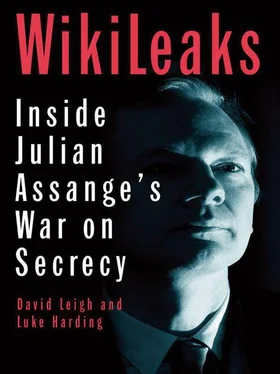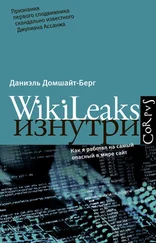Harding, Luke - WikiLeaks - Inside Julian Assange's War on Secrecy
Здесь есть возможность читать онлайн «Harding, Luke - WikiLeaks - Inside Julian Assange's War on Secrecy» весь текст электронной книги совершенно бесплатно (целиком полную версию без сокращений). В некоторых случаях можно слушать аудио, скачать через торрент в формате fb2 и присутствует краткое содержание. Жанр: Старинная литература, на английском языке. Описание произведения, (предисловие) а так же отзывы посетителей доступны на портале библиотеки ЛибКат.
- Название:WikiLeaks: Inside Julian Assange's War on Secrecy
- Автор:
- Жанр:
- Год:неизвестен
- ISBN:нет данных
- Рейтинг книги:3 / 5. Голосов: 1
-
Избранное:Добавить в избранное
- Отзывы:
-
Ваша оценка:
- 60
- 1
- 2
- 3
- 4
- 5
WikiLeaks: Inside Julian Assange's War on Secrecy: краткое содержание, описание и аннотация
Предлагаем к чтению аннотацию, описание, краткое содержание или предисловие (зависит от того, что написал сам автор книги «WikiLeaks: Inside Julian Assange's War on Secrecy»). Если вы не нашли необходимую информацию о книге — напишите в комментариях, мы постараемся отыскать её.
WikiLeaks: Inside Julian Assange's War on Secrecy — читать онлайн бесплатно полную книгу (весь текст) целиком
Ниже представлен текст книги, разбитый по страницам. Система сохранения места последней прочитанной страницы, позволяет с удобством читать онлайн бесплатно книгу «WikiLeaks: Inside Julian Assange's War on Secrecy», без необходимости каждый раз заново искать на чём Вы остановились. Поставьте закладку, и сможете в любой момент перейти на страницу, на которой закончили чтение.
Интервал:
Закладка:
Dinner was more relaxed, though Assange was still obsessed with the New York Times and its behaviour. Asked under what conditions he would now collaborate with the Americans, he said he would only consider it if the paper agreed to run no more negative material about him and offered him a right to reply to the Burns piece with equal prominence. “Good relationships extend to good people, they don’t extend to bad people. Unless we see a very serious counter-offer [from the New York Times ] they have lost their exclusivity … Is the NYT a lost cause or is it a credible media outlet? Have things got that bad?”
The others decided to ignore that for the time being. They talked in more detail about how they could draw up a publication schedule, with agreed themes for each day. Assange was keen for the period of exclusivity to continue beyond the new year, or “the Christian calendar”, as he put it. He said WikiLeaks had already redacted the cables “and if there is a critical attack against us we will publish them all”.
By midnight the restaurant was empty and closing. It was decided that Rusbridger would go and ring Bill Keller in New York while the others relocated – taking the wine with them – to another meeting room back upstairs in the Guardian . Rusbridger had known Keller for about 10 years, which helped shortcut what was bound to be a slightly surreal conversation. “I’m going to tell you what Assange is demanding,” said Rusbridger. “I know what you’re going to say, but I have to go back and say I’ve put this to you.”
“Go ahead,” said Keller.
“OK, he wants a front-page rejoinder for the Burns piece and he also wants a guarantee that you’re not going to publish any more sleazy hit pieces on him.”
Keller let out a little snort. “He can write a letter,” he said curtly. “Strictly speaking, that’s not my department, but I’d certainly use any influence I had to suggest that it’s published. And – what was the second one? – er, you can certainly assure him we are not planning any sleazy hit pieces.”
Rusbridger returned to the room and conveyed Keller’s message. As he feared, Assange reacted furiously, saying this was not sufficient and, in terms, all bets were off. He announced that both the New York Times and Guardian themselves were now to be thrown out of the deal.
It was Georg Mascolo’s turn to speak – deliberately and firmly. The three papers were tied together. If Assange was cutting out the other two papers then Der Spiegel was out, too.
It was now nearly 1.30am. The discussion was going nowhere, so Rusbridger turned to Assange and summarised the position.
“As I see it you have three options. One, we reach no deal; two, you try and substitute the Washington Post for the New York Times ; three, you do a deal with us three.
“One and Two don’t work because you’ve lost control of the material. That’s just going to result in chaos. So I can’t see that you have any option but Three. You’re going to have to continue with us. And that’s good. We have been good partners. We have treated the material responsibly. We’ve thrown huge resources at it. We’re good at working together, we like each other. We’ve communicated well with your lot. It’s gone well. Why on earth throw it away?”
If Assange was convinced, he wasn’t going to show it. Not that night, anyway. Rusbridger could see that doing it Assange’s way he would still be up for another few rounds before dawn. As the WikiLeaks capo di tutti capi headed off coughing into the night, he shook hands with David Leigh, with whom he had previously worked so closely. Assange shot him a meaningful look and said in low, distinct tones: “Be careful.”
The next day Rusbridger sent Mark Stephens 10 bullet points to put to Assange:
• Publish on Nov 29 in a staggered form.
• Run over two weeks or more up to just before Xmas.
• Exclusive to G, NYT, DS (plus El Pais and ? Le Monde).
• Subject matter to be co-ordinated between partners and to stay off certain issues initially. No veto to anyone over subjects covered over whole course of series (post Jan). WL to publish cited documents at same time.
• After Xmas the exclusivity continues for one more week, starting around Jan 3/4.
• Thereafter WL will start to share stories on a regional basis among 40 serious newspapers around the world, who will be given access to “bags” of material relating to their own regions.
• G to hire HB [Heather Brooke] on an exclusive basis.
• If “critical” attack on WL they will release everything immediately.
• If material is leaked to/shared with any other news organisation in breach of this understanding all bets are off.
• If agreed the team will commence work on a grid of stories for the first phase.
Within 24 hours Stephens rang back to say Assange had okayed the deal. Whether or not it met Assange’s criteria for “a gentlemen’s agreement”, it was, anyway, an agreement.
*
Five of the world’s most reputable papers were now committed to selecting, redacting and publishing, on an unprecedented scale, the secret leaked diplomatic dispatches of a superpower. It was a project of astonishing boldness, which stood a chance of redefining journalism in the internet age. But while the newspapers laboured to behave responsibly, Assange continued to go his own way.
Disguising himself as an old woman, as detailed in Chapter 1, he moved operations to his rural hideaway at Ellingham Hall, out in the Norfolk countryside. There, his security over the cables, which he had once described as worth at least $5 million to any foreign intelligence agency, seemed less than watertight. Staff say that Assange handed over batches of them to foreign journalists, including someone who was simply introduced as “Adam”. “He seemed like a harmless old man,” said one staffer, “apart from his habit of standing too close and peering at what was written on your screen.” He was introduced as the father of Assange’s Swedish crony, the journalist Johannes Wahlstrom, and took away copies of cables from Russia and post-Soviet states. According to one insider, he also demanded copies of cables about “the Jews”.
This WikiLeaks associate was better known as Israel Shamir. Shamir claims to be a renegade Russian Jew, born in Novosibirsk, but currently adhering to the Greek Orthodox church. He is notorious for Holocaust-denying and publishing a string of anti-semitic articles. He caused controversy in the UK in 2005, at a parliamentary book launch hosted by Lord Ahmed, by claiming: “Jews … own, control and edit a big share of mass media.”
Internal WikiLeaks documents, seen by the Guardian , show Shamir was not only given cables, but he also invoiced WikiLeaks for €2,000, to be deposited in a Tallinn bank account, in thanks for “services rendered – journalism”. What services? He says: “What I did for WikiLeaks was to read and analyse the cables from Moscow.”
Shamir’s byline is on two previous articles pillorying the Swedish women who complained about Assange. On 27 August, in Counterpunch , a small radical US publication, Shamir said Assange was framed by “Langley spies” and “crazy feminists”. He alleged there had been a “honeytrap”. On 14 September, Shamir then attacked “castrating feminists and secret services”, writing that one of the women involved, who he deliberately named, had once discussed the Cuban opposition to Castro in a Swedish academic publication “connected with” someone with “CIA ties”.
Subsequently, Shamir appeared in Moscow. According to a reporter on the Russian paper Kommersant , he was offering to sell articles based on the cables for $10,000. He had already passed some over to the state-backed publication Russian Reporter . He travelled on to Belarus, ruled by the Soviet-style dictator Alexander Lukashenko, where he met regime officials. The Interfax agency reported that Shamir was WikiLeaks’ “Russian representative”, and had “confirmed the existence of the Belarus dossier”. According to him, WikiLeaks had several thousand “interesting” secret documents. Shamir then wrote a piece of grovelling pro-Lukashenko propaganda in Counterpunch , claiming “the people were happy, fully employed, and satisfied with their government.”
Читать дальшеИнтервал:
Закладка:
Похожие книги на «WikiLeaks: Inside Julian Assange's War on Secrecy»
Представляем Вашему вниманию похожие книги на «WikiLeaks: Inside Julian Assange's War on Secrecy» списком для выбора. Мы отобрали схожую по названию и смыслу литературу в надежде предоставить читателям больше вариантов отыскать новые, интересные, ещё непрочитанные произведения.
Обсуждение, отзывы о книге «WikiLeaks: Inside Julian Assange's War on Secrecy» и просто собственные мнения читателей. Оставьте ваши комментарии, напишите, что Вы думаете о произведении, его смысле или главных героях. Укажите что конкретно понравилось, а что нет, и почему Вы так считаете.












